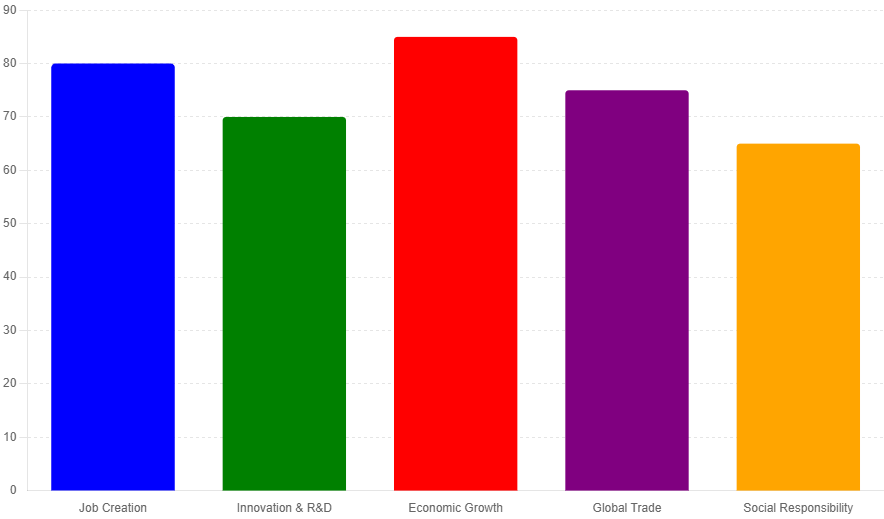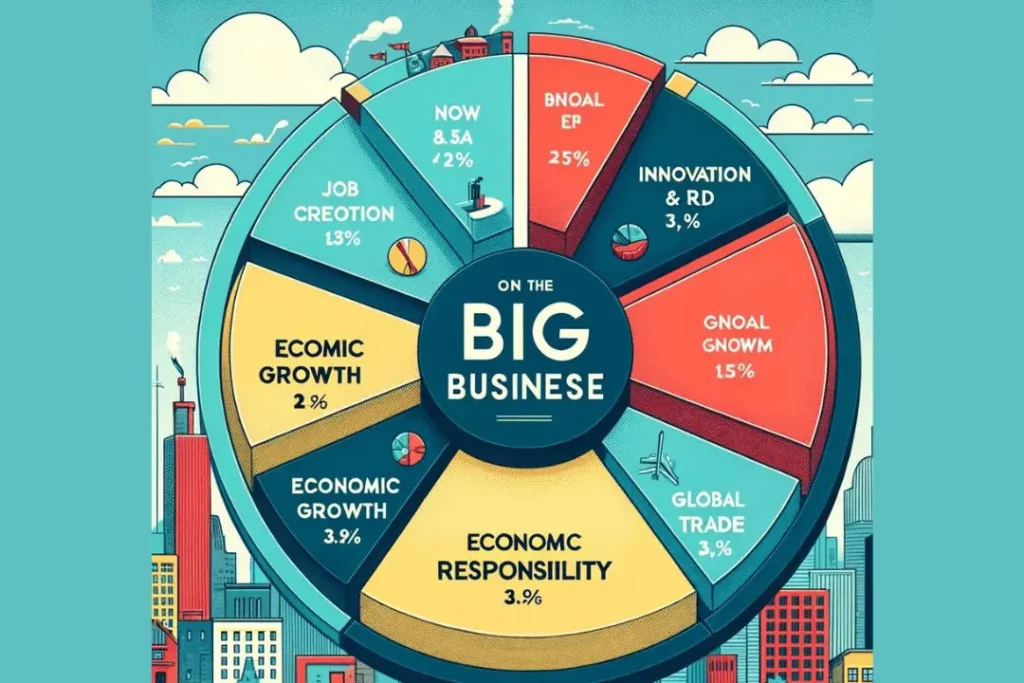Introduction
Big business, often characterized by large-scale operations, significant market influence, and substantial revenue generation, is a driving force in shaping the global economy. These entities, which include multinational corporations and conglomerates, operate across various sectors such as technology, finance, manufacturing, and retail. They not only influence economic policies and market trends but also play a crucial role in job creation and innovation.
Impact Of Big Business On Global Economy

Historical Context
The emergence of big business can be traced back to the Industrial Revolution in the 18th and 19th centuries. During this period, technological advancements and improved transportation facilitated large-scale operations and market expansion. Companies like Standard Oil, U.S. Steel, and the East India Company became pioneers of big business, revolutionizing industries and reshaping social and economic structures.
Job Creation For Big Business

Big businesses are significant employers, providing millions of jobs worldwide. They offer diverse employment opportunities, from entry-level positions to highly specialized roles, contributing to skill development and economic stability.
Job creation is one of the most significant contributions of big businesses to the global economy. By employing millions of people worldwide, these large corporations not only provide livelihoods but also contribute to economic stability and growth. Their expansive operations, ranging from manufacturing to services, create a diverse array of employment opportunities.
Direct Employment
- Wide Range of Opportunities: Big businesses offer a variety of jobs across different sectors. These range from entry-level positions to highly specialized roles in fields like engineering, marketing, finance, and management. This diversity in job roles helps cater to individuals with varying skills, educational backgrounds, and career aspirations.
- Competitive Salaries and Benefits: Large corporations often offer competitive salaries and comprehensive benefits packages. These benefits can include health insurance, retirement plans, paid leave, and professional development opportunities. Such incentives attract top talent and contribute to employee satisfaction and retention.
- Career Advancement: Big businesses typically have structured career paths, offering employees opportunities for promotion and advancement within the company. This can lead to long-term career growth and skill development, making these corporations attractive employers.
Indirect Employment
- Supply Chain Jobs: Big businesses rely on extensive supply chains, which create jobs in related industries. For instance, a large manufacturing company might create jobs in raw material extraction, transportation, and logistics. These supply chain jobs are crucial for the smooth operation of the business and significantly contribute to overall employment figures.
- Service Providers: Large corporations often outsource various services such as cleaning, security, catering, and IT support. These outsourced services generate additional employment opportunities in small and medium-sized enterprises (SMEs) that provide these services.
- Local Economy Boost: The presence of a big business in a community can boost the local economy by increasing demand for local services and products. This can lead to the growth of local businesses and the creation of more jobs within the community.
Impact on Developing Economies
- Industrialization and Infrastructure Development: In developing countries, the establishment of big businesses can lead to significant industrialization and infrastructure development. This not only creates direct jobs but also stimulates economic activity and job creation in other sectors such as construction, transportation, and retail.
- Skill Development and Training: Large corporations often invest in training and development programs for their employees. In developing economies, this can lead to the transfer of valuable skills and knowledge, enhancing the overall skill level of the workforce. This can have long-term positive effects on the local economy.
- Poverty Alleviation: By providing stable employment opportunities, big businesses can play a crucial role in poverty alleviation. Steady incomes allow individuals and families to improve their living standards, access better healthcare and education, and contribute to economic growth.
Innovation and R&D
Large corporations invest heavily in research and development (R&D), driving technological advancements and product innovations. Their R&D efforts lead to improved efficiency, enhanced consumer experiences, and the creation of new markets.
Economic Growth
By boosting productivity and efficiency, big businesses contribute significantly to economic growth. Their operations span multiple regions, creating economic opportunities and enhancing GDP in various countries.
Global Trade
Multinational corporations facilitate global trade through extensive supply chains. This interconnectedness not only increases trade volumes but also fosters economic interdependence among nations.
Social and Environmental Responsibilities
With great power comes great responsibility. Big businesses are increasingly focusing on corporate social responsibility (CSR) initiatives to balance profit-making with positive societal impact.
- Environmental Sustainability: Many large corporations are leading efforts to reduce their carbon footprints and promote sustainable practices. Initiatives such as zero-waste production, sustainable sourcing, and eco-friendly products are becoming more prevalent.
- Social Impact: Companies are investing in social programs related to education, healthcare, and community development. These efforts help enhance corporate reputations and build stronger community ties.
- Ethical Practices: Maintaining ethical business practices is crucial for big businesses to gain consumer trust and comply with regulations. High standards in labor practices, fair trade, and anti-corruption measures are essential for their long-term success.
Challenges and Criticisms

Despite their contributions, big businesses face several criticisms and challenges:
- Market Dominance: Large corporations can stifle competition, leading to monopolistic practices and limited consumer choices. Regulatory bodies monitor these practices to ensure fair competition.
- Labor Issues: Concerns about labor exploitation, poor working conditions, and inadequate wages persist, especially in developing countries where some large corporations operate.
- Environmental Degradation: The industrial activities of big businesses can cause significant environmental harm, including pollution, deforestation, and biodiversity loss.
- Political Influence: The substantial economic power of big businesses translates into considerable political influence, sometimes resulting in policies that prioritize corporate interests over public welfare.
The Future of Big Business
Here is the industry trend table :
| Year | Job Creation (in millions) | Innovation & R&D Investment (in billions) | Economic Growth Contribution (%) | Global Trade Volume (in trillions) | CSR Initiatives Investment (in billions) |
| 2019 | 5.2 | 350 | 2.5 | 18.9 | 20 |
| 2020 | 4.8 | 370 | 2.1 | 17.5 | 22 |
| 2021 | 5.5 | 400 | 3.0 | 19.2 | 25 |
| 2022 | 6.0 | 420 | 3.5 | 20.5 | 28 |
| 2023 | 6.3 | 450 | 3.8 | 21.7 | 30 |
The future of big business hinges on balancing profitability with responsibility. As consumers become more conscious of ethical and environmental issues, companies must adapt to meet these evolving expectations. Embracing technology and innovation will continue to be vital, particularly in areas like artificial intelligence, renewable energy, and sustainable practices.
Big businesses are also positioned to address global challenges such as climate change, economic inequality, and public health crises. By leveraging their resources and influence, they can contribute to creating a more sustainable and equitable world.
Do Contact with us for any queries, services or Business ideas.
Conclusion
Big business is a cornerstone of the global economy, driving innovation, economic growth, and employment. However, with their immense power and influence comes the responsibility to act ethically and sustainably. The ability of these entities to navigate economic, social, and environmental challenges will determine their long-term success and impact on society. The future of big business lies in sustainable practices, ethical operations, and a commitment to creating value for all stakeholders, not just shareholders.
FAQs on the Impact of Big Business on the Global Economy
1. What is the definition of “big business”?
Answer: Big business refers to large-scale corporations and conglomerates that operate in multiple countries, generate substantial revenue, and have significant market influence. These entities often dominate their respective industries and contribute significantly to the global economy through job creation, innovation, and economic growth.
2. How do big businesses contribute to job creation?
Answer: These are major employers, providing millions of jobs worldwide. They offer a wide range of employment opportunities, from entry-level positions to highly specialized roles. Their large-scale operations and extensive supply chains create jobs both directly within the company and indirectly through related industries.
3. Why is innovation and R&D important for Businesses?
Answer: Innovation and research and development (R&D) are crucial for big businesses as they drive technological advancements, improve efficiency, and create new products and services. Investing in R&D helps these companies stay competitive, meet consumer demands, and explore new market opportunities, ultimately contributing to economic growth.
4. In what ways do big businesses impact economic growth?
Answer: Big businesses boost economic growth by increasing productivity and efficiency, generating substantial revenue, and creating jobs. Their operations contribute to the GDP of countries where they operate and stimulate economic activities through their extensive supply chains and business networks.
5. How do big businesses influence global trade?
Answer: Multinational corporations facilitate global trade by establishing supply chains that span multiple countries. This interconnectedness not only boosts trade volumes but also fosters economic interdependence among nations. Their operations often involve importing and exporting goods and services, which drives international trade.
6. What are corporate social responsibility (CSR) initiatives?
Answer: Corporate social responsibility (CSR) initiatives are efforts by companies to operate in an ethical and sustainable manner. These initiatives often focus on environmental sustainability, social impact, and ethical practices. Big businesses invest in CSR to address societal issues, reduce their environmental footprint, and improve their reputation.
7. What challenges and criticisms do businesses face?
Answer: Big businesses face several challenges and criticisms, including market dominance, labor issues, environmental degradation, and political influence. They can sometimes stifle competition, leading to monopolistic practices, and may be criticized for poor labor conditions or contributing to environmental harm. Additionally, their significant economic power can translate into substantial political influence, potentially prioritizing corporate interests over public welfare.
8. What is the future outlook for businesses?
Answer: The future of big business lies in balancing profitability with responsibility. Companies must adapt to evolving consumer expectations regarding ethical and environmental issues. Embracing technology and innovation will continue to be vital, particularly in areas like artificial intelligence, renewable energy, and sustainable practices. Big businesses are also likely to play a crucial role in addressing global challenges such as climate change, economic inequality, and public health crises.
9. How can businesses balance profitability and responsibility?
Answer: Big businesses can balance profitability and responsibility by integrating sustainable practices into their operations, investing in CSR initiatives, and maintaining high ethical standards. By focusing on long-term sustainability and creating value for all stakeholders, not just shareholders, companies can achieve a positive impact on society while remaining profitable.
10. What role do businesses play in addressing global challenges?
Answer: Big businesses have the resources and influence to address global challenges such as climate change, economic inequality, and public health crises. By leveraging their capabilities and collaborating with governments, non-profits, and other organizations, they can contribute to creating a more sustainable and equitable world. This involves investing in renewable energy, promoting fair labor practices, and supporting initiatives that improve community well-being.



